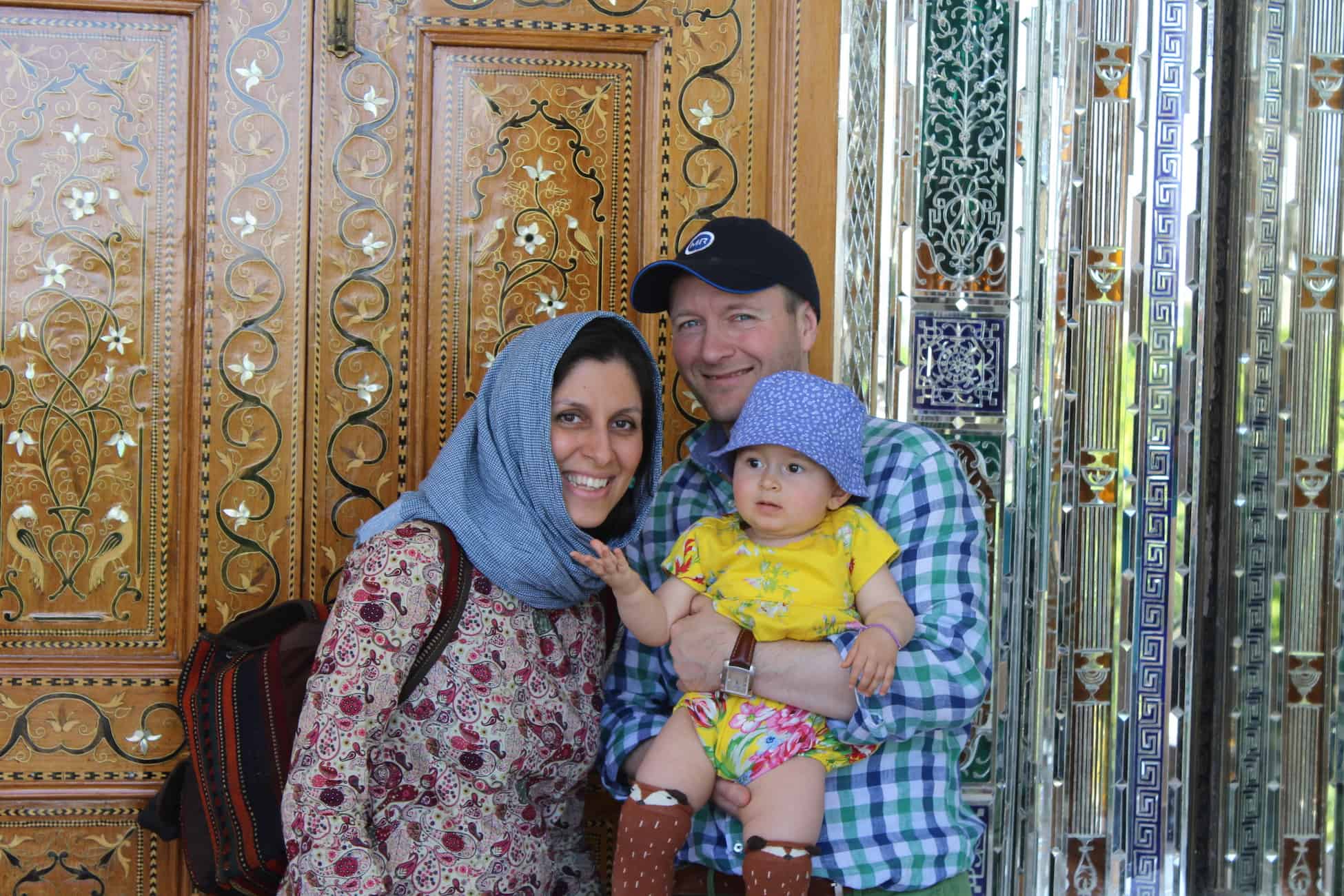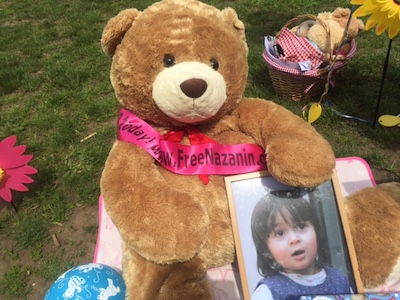Richard Ratcliffe hasn’t seen his wife or their 2-year-old daughter in more than nine months.
In March, Ratcliffe’s wife, Nazanin Zaghari-Ratcliffe, went on vacation with their daughter to visit Iranian relatives. While attempting to fly back to the U.K. from Tehran, Zaghari-Ratcliffe was detained.
Videos by VICE
The Iranian government later sentenced Zaghari-Ratcliffe, a 37-year-old British-Iranian who works for the charity arm of the Thomson Reuters Foundation, to five years in prison on charges including conspiring to topple the government — but the reason for her arrest has not been explained. Her husband believes the Islamic Revolutionary Guard Corps, the hard-line branch of Iran’s armed forces, is using his wife to force the U.K. to square a decades-old £400 million debt, after a prison guard referred to a deal that was “not the nuclear one” and instructed Zaghari-Ratcliffe to pass the message on to her husband.
If true, the Islamic Revolutionary Guard is attempting to get the U.K. to make good on an arms deal that went bad in the wake of the Iranian Revolution in the 1970s. The then-Shah of Iran struck a deal to buy 1,500 Chieftain tanks and 250 repair vehicles from the U.K. for about £650 million. But the sale stalled after the 1979 Iranian Revolution, and the U.K. refused to provide the bulk of the tanks — or give the Iranians their money back. A European Court ruled in 2010 that Iran was entitled to the money it was owed, but to date, the British government hasn’t paid.
“Morally, they [the U.K.] should pay the debt, there’s no justification for not,” Ratcliffe, 41, said. “This is an international court order — and it’s absolutely in the interest of Iran and the U.K. going forward not to have this festering and used as a tool by extremists.”

A U.K. Foreign and Commonwealth Office spokesperson said that the British government remains “deeply concerned” by the reports of Nazanin-Ratcliffe’s sentence. “The prime minister and foreign secretary have both raised her case with their counterparts in Iran and will continue to do so.”
Arshin Adib-Moghaddam, a professor at the School of Oriental and African Studies in London, argues that Iran’s motives might be more political than financial.
“In principle, dual nationals have been used as bargaining chips, not so much to ‘extort’ money but for political purposes,” he said. (Zaghari-Ratcliffe has dual citizenship.) “They have become a very lamentable strategy to hurt the reformists in the complex set-up of domestic politics in the country.”

Hard-liners in Iran have been opposed the Iran nuclear deal, perceived as an overture to the West. President Hassan Rouhani, who is up for re-election in June, has publicly cooled toward the deal, accusing the U.S. of “foot-dragging” earlier this month.
Zaghari-Ratcliffe has been held mostly in solitary confinement since she was arrested, according to her husband. (Their daughter has been living with Zaghari-Ratcliffe’s Iranian relatives.) When he talks to his wife — Iranian guards control when any calls are permitted and likely monitor them — Ratcliffe says he can tell her mental health is deteriorating. In December, she considered taking her own life.
“She went really down at that point where she decided she couldn’t go on,” Ratcliffe said. “She stopped praying, wrote a suicide note — a goodbye note — to me. For me, hearing her talk openly about having written a suicide note and preparing to end things — that was disorienting and scary. I’m shocked by how little energy she has left.”
The U.K. and Iran have a historically strained and complicated relationship. The British embassy was closed in 2011 after attacks and only reopened this year in the wake of the historic nuclear deal between Iran and the P5+1 council, of which the U.S. and U.K. are members. Even with the full restoration of diplomatic relations, the U.K. Foreign and Commonwealth Office doesn’t have access to Zaghari-Ratcliffe because the Iranian government doesn’t recognize dual citizens. In fact, at least five other British dual-nationals are currently imprisoned in Iran, several on similar “espionage” charges. On Tuesday, a minister in the U.K. Parliament called on British Prime Minister Theresa May to issue a statement calling for Zaghari-Ratcliffe’s release.
The U.K. Ministry of Defense would not confirm whether the U.K. will pay back the debt, citing the “commercially sensitive” and confidential nature of negotiations between Iran and International Military Services, the corporation handling the discussions.
Ratcliffe questions if the U.K. has his family’s best interests at heart. He said the British government refused his pleas to transfer his wife’s case to a separate investigation unit that handles kidnapping and hostage crises. “There is a belittling going on, as if she’s a foreign girl, and this is OK,” he said. “Every time the government will say, ‘Well, she’s a dual-national and this is very difficult.’”
The U.K. Foreign and Commonwealth Office said the government is working behind the scenes to resolve it. “We have been supporting her family since we were first made aware of her arrest and the Minister for the Middle East, Tobias Ellwood, has met the family to reassure them that we will continue to do all we can,” a spokesperson for the foreign office said. “While we continue to press the Iranians for consular access and for due process to be followed, we also stand ready to help get her daughter back safely to the U.K. if requested.”
According to Ratcliffe, a hearing on his wife’s case has been set for Jan. 4.




